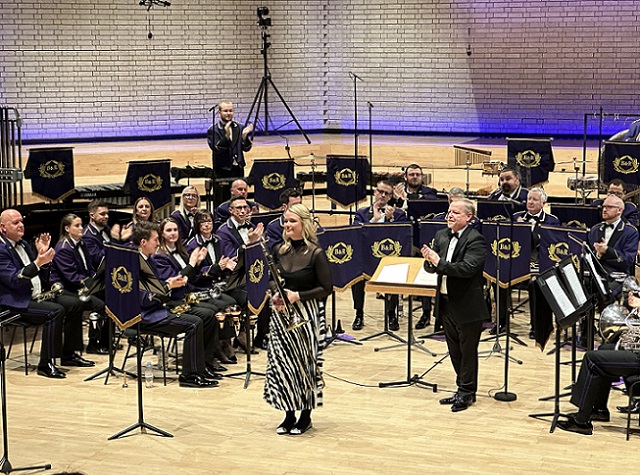

A memorable RNCM Festival concluded with an outstanding concert from Brighouse & Rastrick Band, and a simply remarkable soloist appearance from Isobel Daws.
It also marked the final curtain call of Artistic Director Paul Hindmarsh, who could easily be forgiven for a little touch of (admitted) repertoire self-indulgence with the lovely added surprise of being able to conduct Wifred Heaton's march 'Praise' as an encore.
No one in a packed hall was left bemoaning that they had not had their monies worth and more at its conclusion.
Perfect foil
Russell Gray was the perfect interpretive foil; his understanding of the works complete, considered and absorbing.
‘Resurgam’ was stripped of years of misplaced emotional baggage by the Scotsman, revealing its heartfelt emotional core with the starkest intensity of truthful spirit.
It was also heightened by a perfectly measured segue that flowed from a telling musical character tribute to Bramwell Tovey from Edward Gregson. His ‘A Song for Bram’ also laid out simple truths.
Those with a connection of faith to each composer’s feelings towards personal loss were visibly moved at its hushed conclusion. They were not alone.
Those with a connection of faith to each composer’s feelings towards personal loss were visibly moved at its hushed conclusion. They were not alone.
Guilty Men
An earlier Eric Ball work opened the concert – one that pre-empted a tragedy of unimaginable proportions yet to come.
‘The Triumph of Peace’ was written in the aftermath of Neville Chamberlain’s return to the UK in 1938 brandishing a worthless piece of paper proclaiming ‘Peace in our time’.
Inspired by Matthew 26:52; “Put your sword back in its place. For all who draw the sword will die by the sword”, he instead reflected on the consequences of appeasement by developing a musical structure that drew deeply on his belief that the good of man would defeat its darkest manifestation of depravity.
Ball was no supporter of the ‘Guilty Men’ identified by the polemicist ‘Cato’, who failed to prepare Britain for a war against what he saw as the forces of evil.
Inspired by Matthew 26:52; “Put your sword back in its place. For all who draw the sword will die by the sword”, he instead reflected on the consequences of appeasement by developing a musical structure that drew deeply on his belief that the good of man would defeat its darkest manifestation of depravity.
You were left in no doubt of that as the MD revealed the emotional core with a telling sense of purpose.
Conquest
Two equally dramatic works bookended the interval.
As ‘Celebrations’ go, Arthur Butterworth seems to have taken them seriously in a very literal sense. His ‘Diptych for Brass Band’ was more a confirmation of conquest than carefree post National title knees-up (written to mark Desford’s 1990 Albert Hall victory) – although it did hit you in the head like a particularly heavy hangover.
Her approach to Bramwell Tovey’s ‘Lincoln Tunnel Cabaret’, with the seemingly casual ‘cocktail’ of stylistic malleability underpinned by stunning technique, was jaw droppingly sophisticated and engaging.
‘King Lear’ had little to celebrate either with his squabbling siblings, although Paul Hindmarsh’s sympathetic re-evaluation of Granville Bantock’s score certainly brought his troubles to visceral life. The machinations of power, darkly romantic and dangerous were captured like the background music to old Hollywood movie.
Adding to the outstanding performances came the cast iron ‘A list’ star quality of Isobel Daws.
Her approach to Bramwell Tovey’s ‘Lincoln Tunnel Cabaret’, with the seemingly casual ‘cocktail’ of stylistic malleability underpinned by stunning technique, was jaw droppingly sophisticated and engaging. Her appreciation of Ray Steadman-Allen’s ‘Walk with Me’ simply glowed with respect.
Iwan Fox









